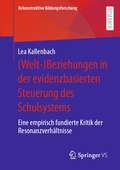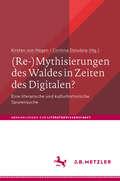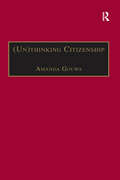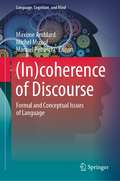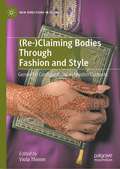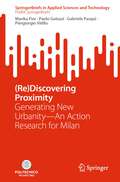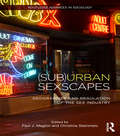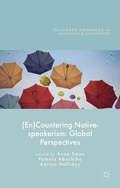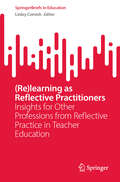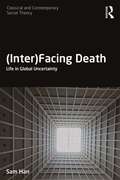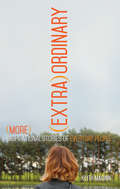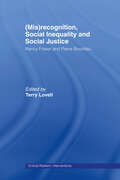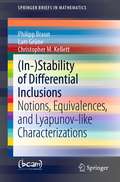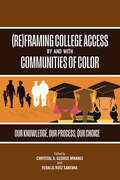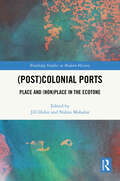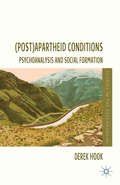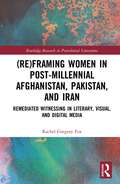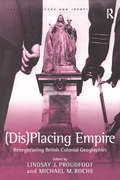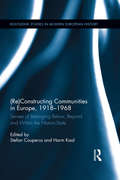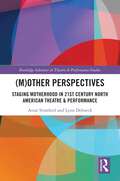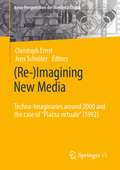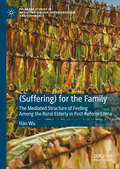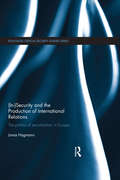- Table View
- List View
**Missing**: Eine empirisch fundierte Kritik der Resonanzverhältnisse (Rekonstruktive Bildungsforschung #38)
by Lea KallenbachAusgehend von erheblichen und anhaltenden Wirksamkeitsdefiziten nimmt Lea Kallenbach in der vorliegenden Arbeit eine Perspektiverweiterung auf die evidenzbasierte Steuerung des Schulsystems vor. Dies erfolgt in zweifacher Weise: theoretisch auf der Grundlage der Weltbeziehungssoziologie (Rosa 2016) und empirisch über die Entwicklung und Anwendung eines rekonstruktiven Zugangs. Hierdurch eröffnen sich neue Interpretationswege, die das Nicht-Gelingen evidenzbasierter Steuerung als Schnittstellenproblematik zwischen einzelnen Ebenen des Schulsystems verstehen.
**Missing**: Eine literarische und kulturhistorische Spurensuche (Abhandlungen zur Literaturwissenschaft)
by Corinna Dziudzia Kirsten Von HagenAktuell ist Wald in öffentlichen Diskursen zentral, verbunden mit einer Re-Mythisierung, die zum einen als Effekt einer ökologisch bedingten Krise und zum anderen als Folge einer Primordialität des Digitalen zu lesen ist. Wald ist Anti-Digitalität, weil umfassend sinnlich erfahrbar. Umso mehr sich gerade das Buch in seiner Materialität vom Wald als rohstoffliefernder Grundlage entfernt, wird der Wald Thema in Ecocriticism, Kulturökologie und Nature Writing. Doch der Wald hat immer schon zahlreiche Mythisierungen erfahren, als Schutz- und Inspirationsort ebenso wie als Denkfigur lassen sich zahlreiche Inszenierungsformen beobachten, die von Dante bis zu aktuellen Serien, Filmen und Comics führen. In den nun versammelten Beiträgen einer neuen nachhaltigen Form von Online-Studientagen wird der Ubiquität des Waldes aus einer interdisziplinären Perspektive nachgespürt.
**Missing**: Einstellungen zu Migranten in Deutschland und Europa (Blickpunkt Gesellschaft)
by Pascal Siegers Sonja Schulz Oshrat Hochman Bettina WestleDieser Band versammelt verschiedene Untersuchungen zu Einstellungen zu Migranten und zu nationalistischem Wahlverhalten, die alle auf repräsentativen Bevölkerungsumfragen beruhen. Insgesamt verdeutlicht die Gesamtschau der in diesem Band versammelten Beiträge die Bedeutsamkeit von (positiven) Kontakten zwischen der deutschen Aufnahmegesellschaft und der Migrantenpopulation. Hinweise auf eine allgemeine Verschlechterung des Meinungsklimas gegenüber ethnischen Minderheiten ergeben sich aus den Studien nicht. Sofern Migration nicht als Bedrohung für den eigenen Status wahrgenommen wird, kann verstärkter Kontakt dazu führen, dass die deutsche Bevölkerung insgesamt toleranter und offener wird. Im Gegenschluss kann eine wahrgenommene Bedrohung des eigenen Status und der eigenen Ressourcen zu einer gesellschaftlichen Polarisierung führen. Der Wandel hin zu einer größeren Akzeptanz Zugewanderter ist also nicht irreversibel: Die „offene Gesellschaft“ in der Bundesrepublik muss ständig aktiv erarbeitet werden.
**Missing**: Feminist Debates in Contemporary South Africa (Gender in a Global/Local World)
by Amanda GouwsThe study of citizenship in the context of South Africa implicitly challenges the rights-based democracy in South Africa, while literature regarding women and citizenship has greatly contributed to a new understanding of citizenship. Locally, many global processes are reproduced in the discourse of rights-claiming, issues of institutional representation, bodily integrity in the face of violence, and care in the face of a lack of care. This volume takes the debate of citizenship in South Africa in a more theoretical and empirical direction while engaging with knowledge produced elsewhere in the world. As part of the Gender in a Local/Global World series, it investigates the making of gendered citizenship, institutionalization of gender politics, the state of gendered policy making, local citizenship, rights, the women's movement, gendered violence, as well as citizenship and the body.
**Missing**: Formal and Conceptual Issues of Language (Language, Cognition, and Mind #10)
by Manuel Rebuschi Michel Musiol Maxime AmblardThis present book explores recent advances in modeling discourse processes, in particular, new approaches aimed at understanding pathological language behavior specific to schizophrenia. The contributors examine the modeling paradigm of formal semantics, which falls within the scope of both linguistics and logic while providing overlapping links with other fields such as philosophy of language and cognitive psychology. This book is based on results presented during the series of workshops on (In)Coherence and Discourse organized by SLAM (Schizophrenia and Language: Analysis and Modeling), a project developed to systemize the study of pathological language processing by taking an overarching interdisciplinary approach combining psychology, linguistics, computer science and philosophy. The principle focus is on conversations produced by people with psychiatric disorders such as schizophrenia and autism. The contributions come from young and experienced researchers, and invited speakers. The book appeals to likeminded students and researchers.
**Missing**: Gendered Configurations in Muslim Contexts (New Directions in Islam)
by Viola ThimmThis book investigates ways of dressing, style and fashion as gendered and embodied, but equally as “religionized” phenomena, particularly focusing on one significant world religion: Islam. Through their clothing, Muslims negotiate concepts and interpretations of Islam and construct their intersectionally interwoven position in the world. Taking the interlinkages between ‘fashionized religion,’ ‘religionized fashion,’ commercialization and processes of feminization as a starting point, this book reshapes our understanding of gendered forms of religiosity and spirituality through the lens of gender and embodiment. Focusing mainly on the agency and creativity of women as they appropriate ways of performing and interpreting various modalities of Muslim clothing and body practices, the book investigates how these social actors deal with empowering conditions as well as restrictive situations. Foregrounding contemporary scholars’ diverse disciplinary, theoretical and methodological approaches, this book problematizes and complicates the discursive and lived interactions and intersections between gender, fashion, spirituality, religion, class, and ethnicity. It will be relevant to a broad audience of researchers across gender, sociology of religion, Islamic and fashion studies.
**Missing**: Generating New Urbanity—An Action Research for Milan (SpringerBriefs in Applied Sciences and Technology)
by Gabriele Pasqui Marika Fior Paolo Galuzzi Piergiorgio VitilloThis book explores the topic of proximity and its relations in the design of contemporary urban fabrics and public spaces. The effects of the COVID-19 pandemic and reflections on the future of cities have lately shed light on the concept of proximity, which is intended as the relationship between communities and urban functions and as relations among people, built spaces, and open spaces. The proximity is a historic and fertile field of interest for American and Northern European urban studies; it is a spatial and social program seemingly surpassed by the styles and rhythms of contemporary city life, but today it is back in vogue with different purposes. Meanwhile, the action research developed by the Department of Architecture and Urban Studies at the Politecnico di Milano for the Municipality of Milan reached its conclusion (2018–2020). The research work focused on contextualizing the new M4 Metro line stations under construction, and jointed mobility flows and places, long-range networks and local ones, boosting the idea of metro stations as regenerative urban thresholds and urban platforms for enabling environmental, sustainable settlement, and active mobility systems. In other words, the action research for Milan shows how to achieve the concept of proximity in the urban design practice in a dense, stratified, and complex urban context.
**Missing**: Geographies and Regulation of the Sex Industry (Routledge Advances in Sociology)
by Paul J. Maginn Christine Steinmetz(Sub)Urban Sexscapes brings together a collection of theoretically-informed and empirically rich case studies from internationally renowned and emerging scholars highlighting the contemporary and historical geographies and regulation of the commercial sex industry. Contributions in this edited volume examine the spatial and regulatory contours of the sex industry from a range of disciplinary perspectives—urban planning, urban geography, urban sociology, and, cultural and media studies—and geographical contexts—Australia, the UK, US and North Africa. In overall terms, (Sub)urban Sexscapes highlights the mainstreaming of commercial sex premises—sex shops, brothels, strip clubs and queer spaces—and products—sex toys, erotic literature and pornography—now being commonplace in night time economy spaces, the high street, suburban shopping centres and the home. In addition, the aesthetics of commercial and alternative sexual practices—BDSM and pornography—permeate the (sub)urban landscape via billboards, newspapers and magazines, television, music videos and the Internet. The role of sex, sexuality and commercialized sex, in contributing to the general character of our cities cannot be ignored. In short, there is a need for policy-makers to be realistic about the historical, contemporary and future presence of the sex industry. Ultimately, the regulation of the sex industry should be informed by evidence as opposed to moral panics. *** Winner of the Planning Institute of Australia (WA) 2015 Award for Excellence in Cutting Edge Research and Teaching ***
**Missing**: Global Perspectives (Palgrave Advances in Language and Linguistics)
by Adrian Holliday Anne Swan Pamela AboshihaThe book addresses the issue of native-speakerism, an ideology based on the assumption that 'native speakers' of English have a special claim to the language itself, through critical qualitative studies of the lived experiences of practising teachers and students in a range of scenarios.
**Missing**: Insights for Other Professions from Reflective Practice in Teacher Education (SpringerBriefs in Education)
by Linley CornishThis book examines significant developments in reflective practice, delving into research conducted with novice teachers. It fills a gap in existing literature by examining the 'how' of reflective practice. How do professionals learn reflective practice, fostering relearning? How do they guide students, mentees, and novices in adopting reflective practices? Stemming from teacher education, the focus is extended beyond this field, emphasizing the relevance of these strategies across professions. It is divided into three parts – thinking about reflection; learning to reflect; and becoming a reflective practitioner. It offers fresh perspectives on conceptualizing reflective practice and suggests practical strategies for integrating it into pre-service coursework, assessment, training, and development. Intended for academics, practitioners, and educators across disciplines, this book serves as a comprehensive guide for anyone committed to fostering reflective practice within their professional sphere.
**Missing**: Life in Global Uncertainty (Classical and Contemporary Social Theory)
by Sam HanIn modern times, death is understood to have undergone a transformation not unlike religion. Whereas in the past it was out in the open, it now resides mostly in specialized spaces of sequestration—funeral homes, hospitals and other medical facilities. A mainstay in so-called traditional societies in the form of ritual practices, death was usually messy but meaningful, with the questions of what happens to the dead or where they go lying at the heart of traditional culture and religion. In modernity, however, we are said to have effectively sanitized it, embalmed it and packaged it—but it seems that death is back. In the current era marked by economic, political and social uncertainty, we see it on television, on the Internet; we see it almost everywhere. (Inter)Facing Death analyzes the nexus of death and digital culture in the contemporary moment in the context of recent developments in social, cultural and political theory. It argues that death today can be thought of as "interfaced," that is mediated and expressed, in various aspects of contemporary life rather than put to the side or overcome, as many narratives of modernity have suggested. Employing concepts from anthropology, sociology, media studies and communications, (Inter)Facing Death examines diverse phenomena where death and digital culture meet, including art, online suicide pacts, the mourning of celebrity deaths, terrorist beheadings and selfies. Providing new lines of thinking about one of the oldest questions facing the human and social sciences, this book will appeal to scholars and students of social and political theory, anthropology, sociology and cultural and media studies with interests in death.
**Missing**: More Inspirational Stories of Everyday People ((Extra)Ordinary #2)
by Keith Maginn“This world needs books like these right now—the inspirational people within these pages.” - Kimberly Morand, blogger"When everything in life goes wrong, what keeps people going? This wonderful collection of answers tells how some conquered the near impossible." - Frank Litsky, retired editor and reporter, The New York TimesBurned on 100 percent of his body as a young boy, John O’Leary was given a 1 percent chance of survival. Thirty years later, he is a bestselling author, nationally known speaker, beloved husband, and dedicated father.Once controlled by addiction, Todd Crandell is now an addiction counselor—and a world-class Ironman triathlete.Born with no arms or legs, Nick Vujicic fought back from the brink of suicide to become a faith-driven motivational speaker admired by people around the world.These are just three of the inspiring lives featured in (Extra)Ordinary: More Inspirational Stories of Everyday People—tales of individuals who started out as “ordinary” but have proven to be anything but.Each of the people featured in (Extra)Ordinary reminds us of the depth of human potential and calls us to find our own strength to make our mark on the world around us. (Extra)Ordinary opens our eyes to the power that rests in each and every person!"I love this book. If you are looking for a book to inspire you, get yourself a copy. You will not be disappointed." - J. Bronder Book Reviews
**Missing**: Nancy Fraser and Pierre Bourdieu (Critical Realism: Interventions (Routledge Critical Realism))
by Nancy Fraser Pierre BourdieuNancy Fraser’s work provides a theory of justice from multiple perspectives which has created a powerful frame for the analysis of political, moral and pragmatic dilemmas in an era of global capitalism and cultural pluralism. It has been developed through dialogue with key contemporary thinkers, including an extended critical exchange with Axel Honneth that touches importantly upon the work of the late Pierre Bourdieu on social suffering. All the essays collected here engage with the work of one or both of these thinkers’. They consider some of the conceptual and philosophical contentions that Fraser’s and Bourdieu’s models have provoked, and offer some compelling examples of their analytical power.
**Missing**: Notions, Equivalences, and Lyapunov-like Characterizations (SpringerBriefs in Mathematics)
by Lars Grüne Philipp Braun Christopher M. KellettLyapunov methods have been and are still one of the main tools to analyze the stability properties of dynamical systems. In this monograph, Lyapunov results characterizing the stability and stability of the origin of differential inclusions are reviewed. To characterize instability and destabilizability, Lyapunov-like functions, called Chetaev and control Chetaev functions in the monograph, are introduced. Based on their definition and by mirroring existing results on stability, analogue results for instability are derived. Moreover, by looking at the dynamics of a differential inclusion in backward time, similarities and differences between stability of the origin in forward time and instability in backward time, and vice versa, are discussed. Similarly, the invariance of the stability and instability properties of the equilibria of differential equations with respect to scaling are summarized. As a final result, ideas combining control Lyapunov and control Chetaev functions to simultaneously guarantee stability, i.e., convergence, and instability, i.e., avoidance, are outlined. The work is addressed at researchers working in control as well as graduate students in control engineering and applied mathematics.
**Missing**: Our Knowledge, Our Process, Our Choice (SUNY series, Critical Race Studies in Education)
by Chrystal A. George Mwangi; Yedalis Ruíz SantanaOffers novel frameworks and models for understanding college access and choice among communities of Color.This much-needed volume brings together academics, practitioners, students, and community members of Color to thoroughly reframe college access and choice in research and practice. Enrollment rates continue to differ substantially by race and ethnicity. While Black, Indigenous, and other People of Color remain inequitably stratified in the pursuit of higher education, many models of college choice are simply insufficient for understanding the college-going processes of diverse students. Continually centering BIPOC knowledge, assets, and needs, contributors provide a series of varied yet connected frameworks grounded in culturally sustaining, community-oriented research. Like the educational journeys it represents, the volume is a communal activity that invites participation. Each chapter concludes with a series of critical reflection questions to guide readers in deeper learning and engagement.
**Missing**: Place and (Non)Place in the Ecotone (Routledge Studies in Modern History)
by Jill Didur Nalini MohabirThis book examines the role of (post)colonial ports in creating and shaping the ecotonal, cultural, historical, material, environmental, socio-political, and economic contexts in formerly colonized regions, spanning the Caribbean, Africa, North America, Europe, and the Pacific.The essays assess the role that literature, visual culture, architecture, archives, and ethnography can play in enriching our understanding of the complex histories of ports and port cities. They present the relation between ports and colonial infrastructure such as immigration checkpoints, detention centers, mines, plantations, shipping containers, canals, sewers, and rivers, and their impact on human and more-than-human environments. The volume approaches (post)colonial ports through the “ecotone,” a concept borrowed from geography and ecology to describe a transition zone where two biological communities meet and mix—such as a forest and a grassland—to bring attention to port (non)spaces as a hinge between their environments, communities, and colonial infrastructure. It foregrounds postcolonial and decolonial approaches to the ecotone to draw attention to the cultural, ecological, and geographical dynamics that inform the social fabric of contemporary ports and port cities in the wake of the empire.This volume is aimed at scholars and postgraduates across disciplines such as literature, geography, fine arts, cultural studies, and history.
**Missing**: Psychoanalysis and Social Formation (Studies in the Psychosocial)
by D. Hook(Post)apartheid Conditions: Psychoanalysis and Social Formation advances a series of psychoanalytic perspectives on contemporary South Africa, exploring key psychosocial topics such as space-identity, social fantasy, the body, whiteness, memory and nostalgia.
**Missing**: Remediated Witnessing in Literary, Visual, and Digital Media (Routledge Research in Postcolonial Literatures)
by Rachel Gregory FoxThis book critically examines the representational politics of women in post-millennial Afghanistan, Pakistan, and Iran across a range of literary, visual, and digital media. Introducing the conceptual model of remediated witnessing, the book contemplates the ways in which meaning is constructed, deconstructed, and reconstructed as a consequence of its (re)production and (re)distribution. In what ways is information reframed? The chapters in this book therefore analyse the reiterative processes via which Afghan, Pakistani, and Iranian women are represented in a range of contemporary media. By considering how Muslim women have been exploited as part of neo-imperial, state, and patriarchal discourses, the book charts possible—and unexpected—routes via which Muslim women might enact resistance. What is more, it asks the reader to consider how they, themselves, embody the role of witness to these resistant subjectivities, and how they might do so responsibly, with empathy and accountability.
**Missing**: Renegotiating British Colonial Geographies (Heritage, Culture and Identity)
by Michael M. RocheWhile there has been for the past two decades a lively and extensive academic debate about postcolonial representations of imperialism and colonialism, there has been little work which focuses on 'placed' materialist or critical geographical perspectives. The contributors to this volume offer such a perspective, asserting the inadequacy of conventional 'self/other' binaries in postcolonial analysis which fail to recognise the complex ways in which space and place were implicated in constructing the individual experience of Empire. Illustrated with case studies of British colonialism in Australia, Hong Kong, India, Ireland and New Zealand in the later nineteenth and twentieth centuries, the book uncovers the complex and unstable spaces of meaning which were central to the experience of emigrants, settlers, expatriates and indigenous peoples at different time/place moments under British rule. In critically examining place and hybridity within a discursive context, (Dis)placing Empire offers new insights into the practice of Empire.
**Missing**: Senses of Belonging Below, Beyond and Within the Nation-State (Routledge Studies in Modern European History)
by Stefan Couperus Harm KaalThis book offers a new perspective on the social history of twentieth-century Europe by investigating the ideals and ideas, the life worlds and ideologies that emerge behind the use of the concept of community. It explores a wide variety of actors, ranging from the tenants of London council estates to transnational cultural elites.
**Missing**: Staging Motherhood in 21st Century North American Theatre & Performance (Routledge Advances in Theatre & Performance Studies)
by Aoise StratfordThis anthology examines maternity in contemporary performance at the intersection of a wide range of topics from nationhood to mental health, queer parenting, embodied dramaturgy, cultural practice, and immigration. Across the breadth of these themes, we interrogate the cultural implications and politics of how we script, perform, receive, and define mothers, challenging many of the normalizing and patriarchal tropes associated with the mother-as-character. This book includes critical essays examining twenty-first century dramatic literature, first-hand ethnographic accounts of motherhood in practice, interviews, feminist manifestos, and artist reflections. In its deliberately curated variety, this collection seeks to resist homogeneity and offer instead a range of approaches to key questions: what versions of motherhood get staged, and why? And how do dramatic representations tell us about the role of mothers in our own fraught contemporary moment? This collection will be of great interest to those in academia who are teaching, researching, or studying in the fields of Theatre and Performance Studies, American Studies, and Feminist and Gender Studies.
**Missing**: Techno-Imaginaries around 2000 and the case of "Piazza virtuale" (1992) (Neue Perspektiven der Medienästhetik)
by Jens Schröter Christoph ErnstThe late 20th century was a formative phase in the history of digital media culture. The introduction of "new media" was associated with promises for the future that still resonate today. This book brings together contributions that discuss key aspects of the "imaginaries" surrounding new media in this epoch. The focus is on the works of the media artist group Van Gogh-TV, especially the historically very important interactive television project "Piazza virtuale" (1992).
**Missing**: Ten Inspirational Stories ((Extra)Ordinary #3)
by Kristin Bartzokis<P><P>Camille. Lynn. Monique. Becky and Margaret. Jaime. Olga. Christina. Rasheera. Odalys. Danielle. <P><P>These are the seemingly everyday women whose stories inspired (Extra)Ordinary Women - and whose resilience and strength will inspire women around the world. <P><P>These women have defeated breast cancer, addiction, and homelessness. They have lived through the Boston Marathon bombing and hundreds of surgeries. They have traveled from foreign lands to create a better life. They have endured brain cancer, abuse, and poverty. They have given a home to dozens of special-needs children. They have known loss, pain, and fear. <P><P>They are survivors. And they share their stories to empower other women who need something - and someone - to believe in. <P><P>(Extra)Ordinary Women reminds us of the amazing stories that we find all around us when we open our eyes, hearts, and minds. <P><P>And these extraordinary women remind us to never give up, never quit, and never underestimate the power of a woman.
**Missing**: The Mediated Structure of Feeling Among the Rural Elderly in Post-Reform China (Palgrave Studies in Mediating Kinship, Representation, and Difference)
by Hao WuFrom the vantage point of rural grandparents’ mediated structure of feelings, this book explores changing family intimacy and dynamics in contemporary rural China in relation to media. Based on a 10-month ethnography involving 18 rural families (live-in studies with 11), it explores how media technology and culture reconfigures desires, attachments, disappointments, and grievances in family life. This book joins the emerging field that emphasizes the importance of affective and emotional, and offers a new perspective in understanding family dynamics in a mediated world. Focusing on separated migrant families, where the younger generation works in the industrial area and the elderly and children remain in villages, the book highlights the role of mediated emotions in connecting and dividing family members. Importantly, it examines how the state-led neoliberal modernization project since the 1980s juxtaposes with the advance of digital media in rural China, and how it further relates to the rural families.
**Missing**: The Politics of Securitisation in Europe (Routledge Critical Security Studies)
by Jonas HagmannThis book provides a framework for analysing the interplay between securitisation and foreign affairs, reconnecting critical security studies with traditional IR concerns about interstate relations. What happens to foreign policymaking when actors, things or processes are presented as threats? This book explains state behaviour on the basis of a reflexive framework of insecurity politics, and argues that governments act on the knowledge of international danger available in their societies, but that such knowledge is organised by markedly varying ideas of who threatens whom and how. The book develops this argument and illustrates it by means of various European case studies. Moving across European history and space, these case studies show how securitisation has projected evolving and often contested local ideas of the organisation of international insecurity, and how such knowledges of world politics have then conditioned foreign policymaking on their own terms. With its focus on insecurity politics, the book provides new perspectives for the study of international security. Moving the discipline from systemic theorising to a theory of international systematisation, it shows how world politics is, in practice, often conceived in a different way than that assumed by IR theory. By the same token, by depicting national insecurity as a matter of political construction, the book also raises the challenging question of whether certain projections of insecurity may be considered more warranted than others. This book will be of much interest to students of critical security studies, European politics, foreign policy and IR, in general.
